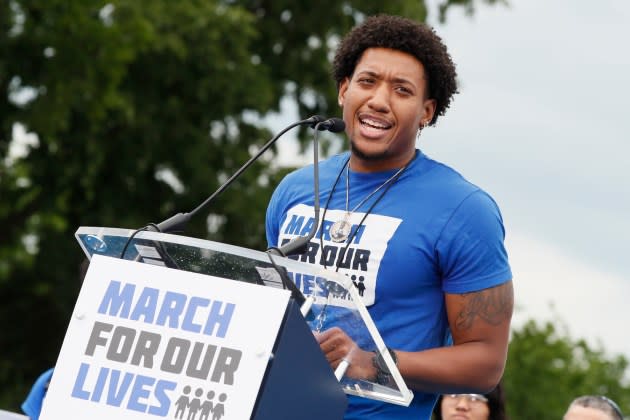Stopping Gun Violence Means Building a Social Safety Net — and Community

This commentary was written by Trevon Bosley, the co-chair of March For Our Lives.
My voice is hoarse in saying it, but it bears repeating. America is faced with an unprecedented epidemic, coupled with unparalleled hypocrisy. Gun violence is the issue of our time. There have been more than 120 mass shootings in 2024, and nearly 5,000 people killed. Hundreds of children and teenagers killed, and over a thousand injured.
You probably aren’t surprised. Gun violence is likely ever present for you; on your mind when you turn on the news, walk into a movie theater, have family night at the bowling alley, travel through your community, or drop your kids off at school. Maybe especially when you drop your kids off at school.
In my case, it’s any time I enter a church. My brother was shot and killed right outside church before band rehearsal when he was just 18. I was seven. I wish I could say my story is unique, but it’s not.
Our politicians love to address this epidemic reactively, peddling the same talking points about law and order, and thoughts and prayers, after every mass shooting, buying just enough time for the new cycle to end. Some folks bring up common-sense solutions, like universal background checks that we know will save lives. Other folks want to add more fuel to the fire, like the Tennessee and Iowa lawmakers who just voted to turn schools into war zones by arming teachers. Sometimes, folks will meet in the middle and vote for armed guards and “school hardening,” things we know just fuel the school-to-prison pipeline, and that we know does little to nothing to reduce violence. Meanwhile, people keep dying.
We need a new strategy.
My generation is tired of the ignorance, stupidity, and insanity of this cycle. We are losing friends, classmates, and hope. But we haven’t lost all hope yet. Poll after poll shows that gun violence is motivating for us to make change, and drives whether or not we’ll support political candidates. The old playbook of thoughts and prayers, rinse and repeat, isn’t working anymore. And young people are bringing to the table a new energy to the fight. We can come back from the brink.
Young people like me might be relatively new to the scene, but we’ve grown up in the shadow of gun violence in a way no other generation has. We’ve injected new energy and momentum to the fight for gun safety. And we believe in another way to safety. That’s why when young people talk about gun safety, we’re not just talking about background checks and conceal carry permits — even though those are important. We’re demanding that gun violence be stopped at its roots, a systemic change. We are calling to abandon the world that allows for gun violence to happen in the first place, and embracing a world where people are cared for.
It’s no coincidence that just as America’s gun violence epidemic has worsened in recent years, homelessness has hit a record high, child poverty has doubled, household income has fallen for the last three years, and we also have the highest incarceration rate of any country in the world. It is a fact that these social and economic inequities directly contribute to our gun violence epidemic and that more economic hardship leads to more gun violence.
But it doesn’t have to be this way. Covid-19 revealed how crucial America’s social safety net is to people’s well-being and success, with pandemic aid programs helping to keep “53 million people above the poverty line” — and bringing the poverty rate to its lowest level on record in 2021.
Many of the lifesaving programs were only a “short-lived lifeline,” as Republicans in Congress refused to renew many of them before they could have a long-lasting impact — causing five million more children to fall into poverty. Just this year, Republican governors in 15 states rejected a federal program that would have given food assistance to hungry children in the summer — overall denying benefits to 8 million children across the country.
As our kids suffer, the right would rather ban drag shows and books and spend more money on our defense budget than the next 10 countries combined, than address social inequity.
Enough is enough. We cannot end gun violence while continuing to support a system that ignores social inequality and leaves our kids hungry. We cannot have one without the other.
That’s why when young people say we want gun safety, we also mean universal health care and mental health services, economic opportunity, an end to the carceral system and an investment in community programs, funding for our schools and children, and a safety support network that doesn’t let people fall through the cracks. When we invest in these social programs, we’re investing in our people and in our communities, making them more prosperous and safer.
We also need a robust investment in the things that communities around the country need in order to live in safety, including community-based violence reduction programs, suicide prevention programs, domestic violence prevention programs, and mental and behavioral health care programs. Our leaders can’t continue to throw money at a carceral and police system that doesn’t work, costs more money, and destroys lives, especially those in Black and brown communities.
This is the youth agenda to end gun violence. This is how we will make long-lasting change and end this epidemic. And this is how, once again, March For Our Lives and young people across the country will demand systemic change to save lives. As we enter a crucial election year, we won’t settle for less, and we won’t stop until we have a country free of gun violence and economic and racial injustice.
More from Rolling Stone
Best of Rolling Stone

